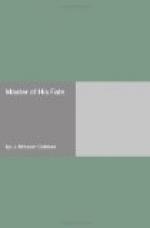“Have you ever found something happen or appear,” said Julius, “that completely upsets your point of view, and tumbles down your scheme of life, like a stick thrust between your legs when you are running?”
“I have known,” said Lefevre, “a new fact arise and upset a whole scientific theory. That’s often a good thing,” he added, with a pointed glance; “for it compels a reconstruction of the theory on a wider and sounder basis.”
“Yes,” murmured Julius; “that may be. But I should think it does not often happen that the new fact swallows up all the details that supported your theory,—as Aaron’s rod, turned into a serpent, swallowed up the serpent-rods of the magicians of Egypt,—so that there is no longer any theory, but only one great, glorious fact. I do admire,” he exclaimed, swerving suddenly, “the imagination of those old Greeks, with their beautiful, half-divine personifications of the Spirits of Air and Earth and Sea! But their imagination never conceived a goddess that embodied them all!”
“I have often thought, Julius,” said Lefevre, “that you must be some such embodiment yourself; for you are not quite human, you know.”
The doctor said that with a clear recollection of his mother’s request. He hoped that his friend would take the cue, and tell him something of his family. Julius, however, said nothing but “Indeed.” Lefevre then tried to tempt him into confession by talking about his own father and mother, and by relating how the French name “Lefevre” came to be domiciled in England; but Julius ignored the temptation, and dismissed the question in an eloquent flourish.
“What does a man want with a family and a name? They only tie him to the earth, as Gulliver was tied by the people of Lilliput. We have life and health,—if we have them,—and it is only veiled prurience to inquire whence we got them. A man can’t help having a father and a mother, I suppose; but he need not be always reminding himself of the fact: no other creature on earth does. For myself, I wish I were like that extraordinary person, Melchizedek, without father and without mother, without descent, having neither beginning of days nor end of life.”




